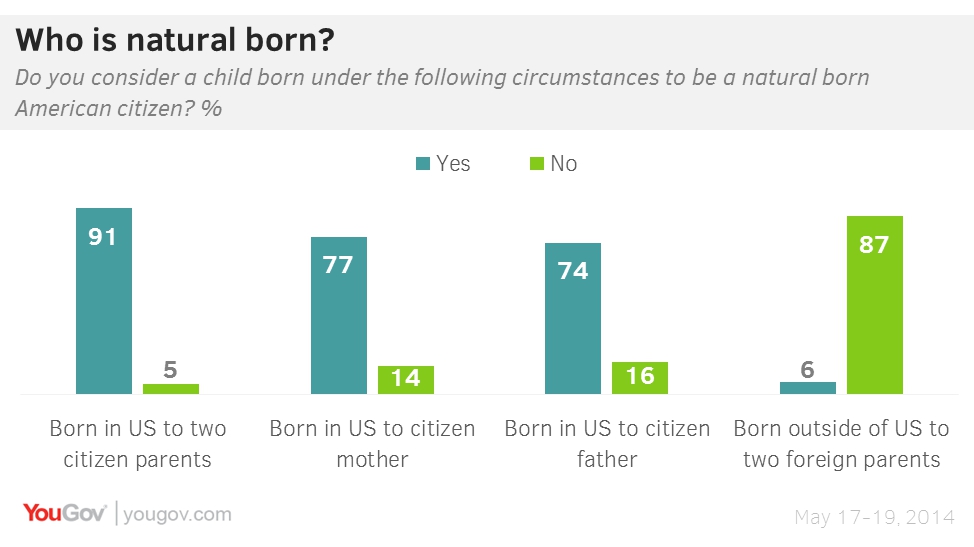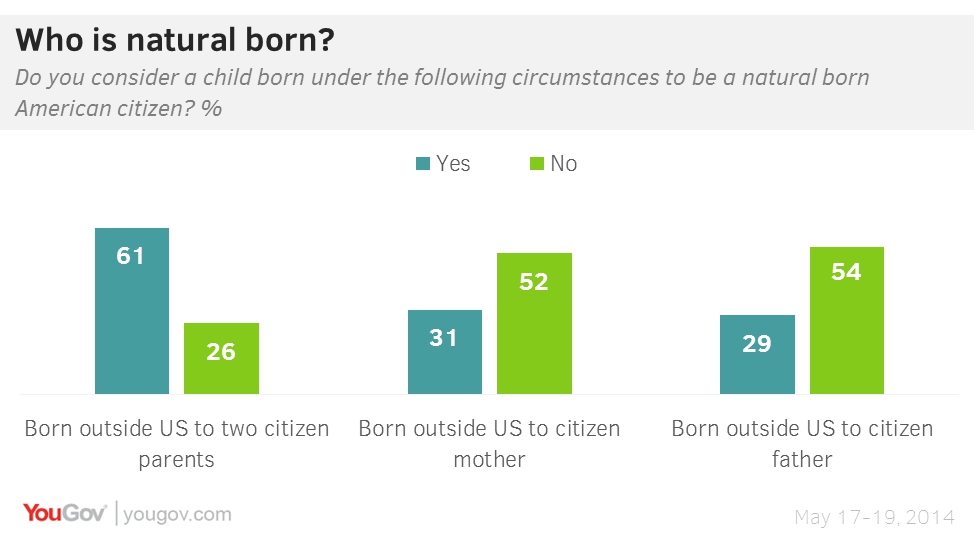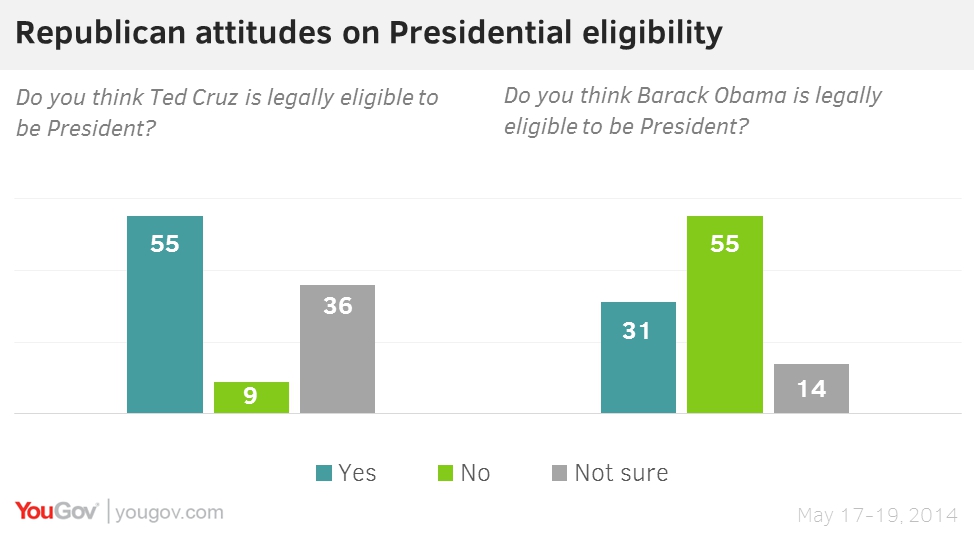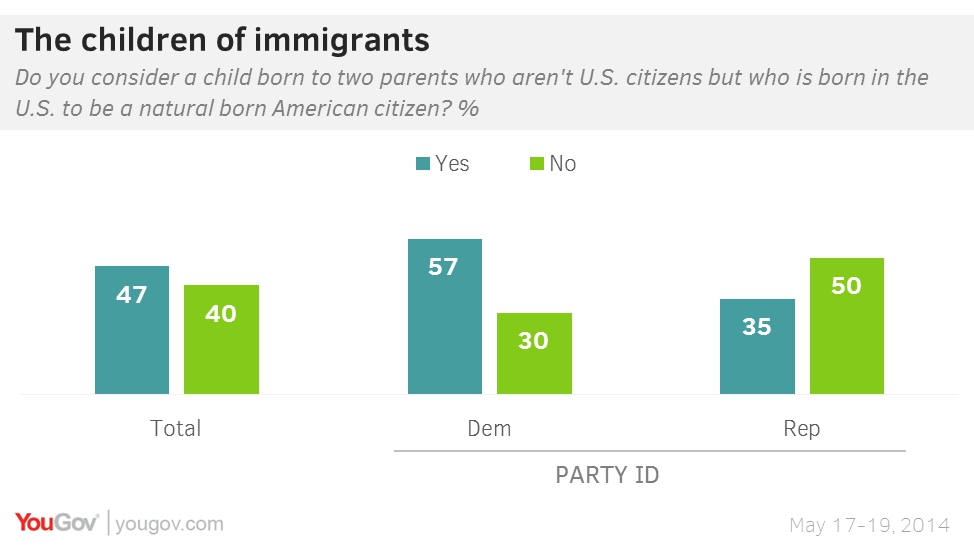
Posted on 05/25/2014 6:04:01 AM PDT by SeekAndFind
Partisanship plays a major role in how Americans decide who should be eligible for the Presidency, and the concept of what being “natural born” means also plays a role. The U.S. Constitution, in Article II, states that only “natural born” citizens are eligible to serve (it also sets an age limit and grandfathered in anyone who was a citizen at the time of the adoption of the Constitution). In the latest Economist/YouGov Poll, saying someone is eligible to serve depends on who you are.
Nearly everyone agrees that someone born in the United States with two citizen parents is a natural born American, and nearly everyone agrees that someone born outside the United States to NON-citizen parents is not. About three in four – Republicans, Independents and Democrats – believe having only one citizen parent and being born in the United States qualifies you as natural born.

If you are born outside the United States, most Americans say you need to have two American-citizen parents. That would make John McCain, the 2008 GOP presidential nominee, natural born, as his U.S. citizen U.S. military parents were stationed in the Panama Canal Zone when he was born. But more than half say that if you are born outside the United States, and only one parent is a citizen, you are not a natural born American,

That means more than half of Republicans (53%) would disqualify Texas Senator Ted Cruz from the Presidency on principle. Cruz was born in Canada to a mother who was an American citizen, while his father was not. But fewer than one in four Republicans think Cruz was born outside the country; only 10% know his mother was a citizen and his father was not.
Of course, some of those Republicans may be answering the question by making a statement about President Barack Obama, and not Ted Cruz. Nearly half of Republicans say they believe the President was born outside the United States, not in Hawaii, and most of those say his mother was a citizen and his father not.
Consequently, most Republicans say Cruz is legally eligible to be President, while President Obama is not.

Tea Party Republicans are even more sure Cruz is eligible (68% think that), but most of them don’t know he was born outside the United States. Tea Party Republican say the President was born outside the United States, and less than a third think he is legally eligible to serve as President.
There are large party differences for one option. Is someone a natural born American who was born in the United States, but to two immigrant parents? Democrats say they are, while Republicans disagree. Parties have nominated children of immigrants for the Presidency (Michael Dukakis in 1988), but no child of two immigrants has been elected President since Andrew Jackson in 1828 (and he was born in the Carolinas before the adoption of the Constitution, and therefore grandfathered in to presidential eligibility).

Florida Senator Marco Rubio was born in the United States, but his parents, immigrants from Cuba, were not yet citizens when he was born. Half of Republicans say that would disqualify someone from being “natural born,” as the Constitution requires to run for President.
‘What happens in Massachusetts stays in Massachusetts’.
Does not apply to all other states.
Actually, it DOES apply since it shows how the terms were thought of at the time by some of the people who actually voted to ratify the US Constitution. That is pretty good evidence of ‘original intent’...
I agree that all citizens are equal under the law, however under the law a seventeen year old citizen cannot vote, which is a privilege of citizenship.
There have been alternative points of view from the time of the Founding and Framing right up to the present.
For example: “It is an established maxim, that birth is a criterion of allegiance. Birth, however, derives its force sometimes from place, and sometimes from parentage; but, in general place is the most certain criterion; it is what applies in the United States; it will therefore be unnecessary to investigate any other.”—Congressman James Madison, May 22, 1789.
“Subject’ and ‘citizen’ are, in a degree, convertible terms as applied to natives; and though the term ‘citizen’ seems to be appropriate to republican freemen, yet we are, equally with the inhabitants of all other countries, ’subjects,’ for we are equally bound by allegiance and subjection to the government and law of the land.’
…every child born in England of alien parents was a natural-born subject, unless the child of an ambassador or other diplomatic agent of a foreign state, or of an alien enemy in hostile occupation of the place where the child was born.—Supreme Court of the United States, U.S. v. Wong Kim Ark
(1898)
Title 8 of the U.S. Code of Laws, Section 1401:
“The following shall be nationals and citizens of the United States at birth:
(g) a person born outside the geographical limits of the United States and its outlying possessions of parents one of whom is an alien (Cruz’s Cuban born father), and the other a citizen of the United States who, prior to the birth of such person, was physically present in the United States or its outlying possessions for a period or periods totaling not less than five years, at least two of which were after attaining the age of fourteen years (Cruz’s Delaware born mother).”
Well, he made the right choice, didn't he? Cruz is a smart guy!
This is exactly what the founding fathers wanted to avoid by declaring that a President must be a Natural Born Citizen.
The Founders wanted to avoid a Maximilian I of Mexico scenario, in which Eurotwit nobility somehow washes up on this side of the pond and manages to infiltrate the highest office. (The Mexicans ended up impeaching Max with extreme prejudice, at the tender age of 34).
33 who have someone enter their country... Illegally. Your wacked effort to disprove my explanations leaves you blinded to all actual circumstances. Misapplication of many laws has become so ingrained in our society that clear-eyed assessments are nearly impossible. You are an extreme example, but even normal people REFUSE to accept explanations of law that upset their personal paradigms. Another example: possession. Possession of anything implies intent to distribute. So possession with intent to sell is redundant. Possession implies commercial activity which gets the Feds jurisdiction via the Commerce Clause on nearly EVERYTHiNG you OWN because people always admit possession because they MISUNDERSTAND what the word means in a court of LAW. You are so far in left field there is really little hope of you gaining enlightment with regard to the 14th or anything else.
The key is “some people”, these being those in Massachusetts. All others in the USA were not necessarily HUPAs.
It's OK to admit when you're wrong. People won't think less of you for it.
You are so far in left field there is really little hope of you gaining enlightment with regard to the 14th or anything else.
Not from you apparently.
So we should substitute your ideas, in 2014, over the obvious understanding of those who ratified the Constitution? Because you know more about how legal language was used in the 1780s than the people who actually used it in the 1780s?
Riigghhhttttt!!!!!!!!!!!!!!!!!
It snuck out of Massachussett to Vermont as well. The Vermont Constitution of 1777 also used "natural born subject" interchangeably with "natural born citizen:"
SECTION XXXVIII. Every foreigner of good character, who comes to settle in this State, having first taken an oath or affirmation of allegiance to the same, may purchase, or by other just means acquire, hold, and transfer, land or other real estate; and after one years residence, shall be deemed a free denizen thereof, and intitled to all the rights of a natural born subject of this State; except that he shall not be capable of being elected a representative, until after two years residence.
In the period leading up to drafting of the U.S. Constitution, there was no use in English of the term "natural born" where it meant "from like parents." As pointed out earlier on this thread, the first English translation of Vattel using "NBC" (instead of "indigenes") wasn't produced until a decade later. It's not plausible to maintain the Framers used the term "natural born," but intended a meaning not previously used, and that they did this while leaving no record of discussion that a new meaning was being adopted.
"The citizenship of no man could be previous to the declaration of independence, and, as a natural right, belongs to none but those who have been born of citizens since the 4th of July, 1776."....David Ramsay, 1789.
A Dissertation on Manner of Acquiring Character & Privileges of Citizen of U.S.-by David Ramsay-1789
The Law of Nations or the Principles of Natural Law (1758)
The Laws of Nature and of Nature's God: The True Foundation of American Law
Incorrect.
English Editions of the Law of Nations (1760,1787,1793,1797)
In U.S. v. Wong Kim Ark, the U.S. Supreme Court analyzed the 14th Amendment term "born . . . in the United States, and subject to the jurisdiction thereof" to be an adoption of the common law meaning of "natural born citizen," which in turn derived its jus soli meaning from the English common law term "natural born subject." And it applied this to Mr. Wong, who was born in the U.S. of resident alien parents.
"The citizenship of no man could be previous to the declaration of independence, and, as a natural right, belongs to none but those who have been born of citizens since the 4th of July, 1776."....David Ramsay, 1789.
And we all know that Ramsay wrote that trying to disqualify William Loughton Smith (who had just beaten Ramsay for a House seat). And we all know that the House soundly rejected Ramsay's claims.
It's not clear whether you offer this to rebut my claim that up to the time of the drafting of the Constitution there was no English language usage of "natural born" conveying the meaning of "from like parents," but this coming in 1789 doesn't predate the Constitutional Convention of 1787.
Nothing in that thread disproves my claim. The two reproductions of section 212 provided -- one from 1787 (Post #99) and one from 1796 (Post #125) -- both read "natives or indigenes." "Natural born citizen" is absent.
And the version you linked on your prior post which contains the phrase "natural born citizen" in section 212 is from the 1797 Edition! (The bit at the outset reading "Preface to the 1797 Edition" should have clued you in.)
So my claim stands.
Correction: the copy of the 1796 edition, section 212 was Post #131; the cover page was #125.
“The Constitution does not say, in words, who shall be natural born citizens. Resort must be had elsewhere to determine that.”—Supreme Court of the United States, Minor v. Happersett (1875).
The Founding Fathers made provision for any of their original thinking about the law of the land to be changed by amending the Constitution.
Whatever was the consensus of thinking of the Framers on the meaning of natural born citizen (there was no vote nor discussion on the issue), the 14th Amendment clearly states that since 1868 there are only two types of American citizens: “ALL PERSONS born and naturalized...”.
There has never been a distinction made in law or court decision between an Article II, Section 1 “natural born citizen” and a 14th Amendment “Citizen of the United States at Birth.” They are one and the same.
Founder and Framer James Madison would agree. In 1789 he said, on the floor of the House of Representatives: “It is an established maxim, that birth is a criterion of allegiance. Birth, however, derives its force sometimes from place, and sometimes from parentage; but, in general place is the most certain criterion; it is what applies in the United States. It will therefore be unnecessary to investigate any other.”
Today, if a person is not born in the United States, then the status of a parent or both parents comes into play in determining citizenship status.
I would have no problem at all with amending the Constitution or changing/spelling out in statute the requirements to be a natural born citizen. But that distinction does not exist in law today.
Disclaimer: Opinions posted on Free Republic are those of the individual posters and do not necessarily represent the opinion of Free Republic or its management. All materials posted herein are protected by copyright law and the exemption for fair use of copyrighted works.